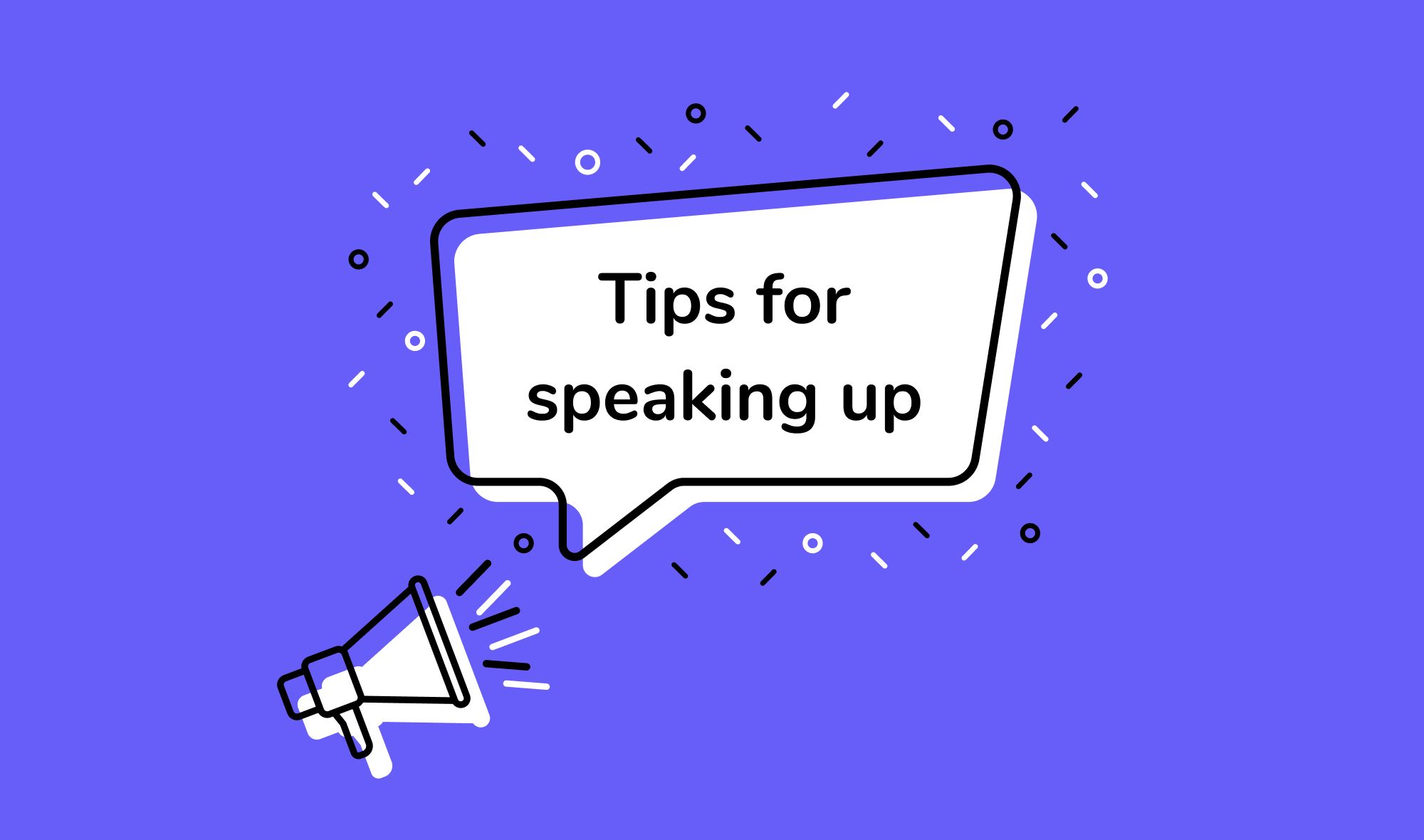Don't let fear hold you back: tips for speaking up for yourself
By Remy Meraz • May 22, 2023
Key Takeaways
- Speaking up is important for advocating for yourself and others, promoting positive change, and building confidence and leadership skills.
- Staying silent can have negative consequences, including frustration, resentment, and the continuation or escalation of problems.
- Overcoming the fear of speaking up involves reframing our mindset, practicing assertiveness and active listening skills, and building a support network of like-minded individuals.

Do you ever find yourself staying silent when you have an opinion to share or a feeling to express? You're not alone. Many of us struggle with speaking up for ourselves and others due to fear and hesitation. We worry about social threats, consequences, and staying silent out of fear of making things worse.
However, staying silent often makes things worse in the long run. Speaking up allows us to express our opinions, share our perspective, and take action towards creating positive change.
In this post, we'll explore why speaking up is important and provide tips on how to overcome fear and find your voice.
Join our Newsletter
Transform your career with our personal growth insights. Get one valuable tip right in your inbox every Saturday morning.
Why speaking up is important
Speaking up can be a critical first step towards creating positive change in our lives, relationships, and organizations. Here are some reasons why:
Examples of situations where speaking up is necessary
There are many situations where speaking up is necessary, such as when we witness something unjust, when we disagree with a decision or action, or when we need to express our feelings and needs in a relationship. For example, if we witness someone being treated unfairly at work or in our community, speaking up can help to address the injustice and advocate for the person who is being mistreated. Similarly, if we disagree with a decision that is being made by a group or organization we're part of, speaking up can help to ensure that all voices are heard and that the decision is made with the best interests of everyone in mind.
In relationships, speaking up can be important for setting boundaries, expressing our needs, and fostering trust and mutual understanding. For example, if we're feeling hurt or upset by something our partner or friend has said or done, speaking up can help to address the issue and prevent resentment or misunderstanding from building up over time. By speaking up with kindness and compassion, we can strengthen our relationships and build deeper connections with the people around us.
Consequences of not speaking up
When we don't speak up, we may feel frustrated, resentful, or powerless. In addition, staying silent can allow problems to continue and escalate. For example, if we witness someone being bullied or mistreated at work or in our community, staying silent can allow the behavior to continue unchecked and can contribute to a toxic or unhealthy environment. Similarly, if we're unhappy with a decision that is being made by a group or organization we're part of, staying silent can make us feel resentful or excluded and can prevent us from contributing to positive change.
In relationships, staying silent can also have negative consequences. If we stay silent and don't speak up about our needs or feelings, our partner or friend may not be aware of what's going on for us and may inadvertently hurt us or neglect our needs. This can lead to feelings of loneliness, disconnection, or even the breakdown of the relationship.
Benefits of speaking up
Speaking up can help us to assert our needs and boundaries, build our confidence and leadership skills, and foster positive relationships and collaboration with others. When we decide to speak up, we demonstrate our willingness to take action and advocate for what we believe in, which can be an important part of building self-respect and self-esteem.
In addition, speaking up can help us to develop our communication and leadership skills, which can be valuable in both personal and professional contexts. By practicing speaking up, we can learn to express ourselves more effectively, listen to others with empathy and understanding, and collaborate with others towards common goals. This can lead to greater success and fulfillment in all areas of life.
Overcoming the fear of speaking up

Understanding the fear of social threat
Many of us fear speaking up because we worry about the consequences of how others might perceive us or their response to our ideas. This fear of social threat can manifest in different ways, such as worrying about being judged, criticized, or rejected. However, it's important to recognize that this fear is often unfounded and that we have the power to challenge it.
One way to challenge the fear of social threat is to question the assumptions we're making about how others might react. Are we assuming that they'll be critical or dismissive without any evidence to support this idea? Are we underestimating our own ability to articulate our ideas effectively? By challenging these assumptions and focusing on the facts, we can begin to feel more confident in our ability to speak up.
Another way to overcome anxiety and the fear of social threat is to practice self-compassion. Instead of judging ourselves harshly for feeling scared or anxious, we can recognize that these emotions are normal and understandable. By showing ourselves compassion and kindness, we can reduce the intensity of our fears and cultivate a more positive mindset.
Tips for taking a deep breath and speaking up
When we're feeling anxious or nervous about speaking up, taking a deep breath can help us to calm our nerves and find our voice. However, it's not always easy to remember to take a deep breath in the moment. That's why it can be helpful to practice deep breathing regularly as a way to build our skills and confidence.
One technique for deep breathing is to inhale slowly and deeply through your nose, hold the breath for a few seconds, and then exhale slowly through your mouth. You can also try counting to four as you inhale, holding the breath for four seconds, and then exhaling for four seconds. Practicing deep breathing regularly can help us to regulate our emotions and feel more grounded when we need to speak up.
Other tips for overcoming the fear of speaking up include practicing what you want to say, focusing on your purpose, and reframing your mindset. For example, you can practice speaking up in low-stakes situations, such as with a friend or family member, before tackling more challenging situations. You can also focus on your purpose for speaking up, such as wanting to share your perspective or advocating for someone else. Finally, you can reframe the fear of speaking up as an opportunity for growth and learning, rather than as a threat.
If you find yourself feeling anxious or overwhelmed about speaking up, it's important to take some time to calm down and center yourself. Here are some tips for calming anxiety at work.
Reframing the fear of speaking up as an opportunity
Instead of viewing the fear of speaking up as a barrier, try reframing it as an opportunity for growth and learning. When we speak up, we can gain confidence and develop new skills that can benefit us in various aspects of life.
For example, speaking up can help us to develop our communication and leadership skills, which can be valuable in both personal and professional contexts. When we speak up, we also demonstrate our willingness to take risks and advocate for what we believe in, which can be an important part of building self-confidence and self-respect.
To reframe the fear of speaking up as an opportunity, try focusing on the potential benefits of speaking up rather than the potential risks. Ask yourself what you might gain by sharing your perspective or advocating for yourself or others. By focusing on the positive aspects of speaking up, we can feel more motivated and empowered to talk and take action.
Join our Newsletter
Transform your career with our personal growth insights. Get one valuable tip right in your inbox every Saturday morning.
Speaking up for yourself at work
The importance of advocating for oneself as a team member
As a team member in a company or organization, it's important to advocate for ourselves and our needs in order to be effective and successful. When we advocate for ourselves, we demonstrate our value and our commitment to the team's success. By speaking up about our needs, concerns, and ideas, we contribute to a more collaborative and productive work environment.
Examples of speaking up for oneself at work
There are many ways that we can speak up for ourselves at work, such as advocating for a promotion, asking for more support or resources, or addressing a conflict of interest with a colleague or manager. For example, if we feel that we deserve a raise or promotion based on our contributions and performance, we can speak up and make our case to our manager. Similarly, if we're feeling overwhelmed or unsupported in our work, we can speak up and ask for more resources or assistance.
If we're experiencing a conflict with a colleague or manager, speaking up can help to resolve the issue and prevent it from escalating. By expressing our perspective and concerns in a respectful conversation and constructive way, we can work towards finding a mutually beneficial solution.
How to address feeling bad for speaking your mind
Speaking up for ourselves at work can sometimes make us feel guilty or uncomfortable, especially if we're not used to advocating for ourselves or other team members, or if we're worried about how others will perceive us. However, it's important to remember that advocating for ourselves is not selfish or unprofessional; rather, it's an important part of being an effective team member.
To address feelings of guilt or discomfort, try reframing your mindset and focusing on the positive aspects of speaking up. Ask yourself what you might gain by talking and advocating for yourself, such as more respect, better opportunities, or a stronger sense of self-worth. You can also practice assertiveness skills, such as using "I" statements and expressing your needs and boundaries clearly and respectfully.
Speaking up for others

The importance of speaking up for others
Speaking up for others can help to promote justice, equity, and inclusivity in our communities and workplaces. When we advocate for others, we demonstrate our commitment to social responsibility and our willingness to stand up for what is right. By speaking up for others, we can also build trust and respect with those around us, and create a more positive and supportive environment for everyone.
To understand the depth of these signs and how to identify and correct negative workplace culture, check out our comprehensive guide.
Examples of speaking up for others
There are many situations where speaking up for others is necessary, such as when we witness discrimination or harassment, when we observe someone being excluded or mistreated, or when we want to amplify someone's voice or perspective. For example, if we witness someone being discriminated against based on their race or gender, speaking up can help to challenge the discrimination and advocate for the person who is being mistreated.
Similarly, if we observe someone being excluded or mistreated in a social or professional setting, speaking up can help to address the issue and promote a more inclusive and respectful environment. Finally, if we want to amplify someone's voice or perspective, we can speak up and advocate for them, whether by sharing their work, words or ideas with others, or by giving them a platform to speak for themselves.
How to address the fear of speaking up for others
Speaking up for others can be challenging, especially if we're worried about how others will react or if we're concerned about the potential consequences. However, it's important to remember that speaking up for others is not only morally right, but it can also be a powerful tool for creating positive change.
To overcome the fear of speaking up for others, try focusing on the values and principles that motivate you to speak up, such as justice, equality, or compassion. You can also practice active listening skills, such as listening to others with empathy and respect, and seeking to understand their perspective before advocating for them. Finally, you can build a support network of like-minded individuals who share your values and can provide encouragement and validation when you need it.
Conclusion
Speaking up for ourselves and for others can be challenging, but it's an essential part of creating positive change in our lives and in our communities. By overcoming our fears and advocating for ourselves and others, we can build our confidence and leadership skills, cultivate stronger relationships and collaboration, and promote justice, equity, and inclusivity.
Remember that speaking up is not only a right, but a responsibility. We all have our own experience and unique perspectives and experiences to share, and by speaking up, we can help to create a more diverse, equitable, and just world. Whether we're speaking up in a personal or professional setting, for ourselves or for others, we can make a difference by using our voice and our power to promote positive change.
So the next time you feel afraid to speak up, take a deep breath, and remind yourself of the potential benefits and positive impact that speaking up can have. Whether you're advocating for yourself or for others, you have the power to make a difference and create a better future for yourself and those around you.
For more information on our work, please visit our website or read our recent blog post: Zella Life selected for Google for Startups Latino Founders Fund.
If you're interested in improving your relationships further, check out our recent blog post on how to stop being jealous for expert advice.
Read more about: Self Advocacy
About Remy Meraz
Remy Meraz, co-founder, and CEO of Zella Life, is a visionary leader who leveraged corporate glass ceiling challenges as a woman of color to drive systemic change.
While leading and cultivating high-performance teams from VC-backed startups to Fortune 500, she consistently faced obstacles such as inadequate mentorship, lack of psychological safety, and non-personalized training. Taking matters into her own hands, she turned to executive coaching and NLP training. This life-changing growth experience led to breaking leadership barriers and a passion for cognitive psychology.
Motivated by her experiences, she co-founded Zella Life, an innovative AI-driven coaching platform bridging the talent development gap by enhancing soft skills and emotional intelligence (EQ) in the workplace.
Her vision with Zella Life is to transform professional development into an inclusive and impactful journey, focused on the distinct needs of both individuals and organizations. She aims to promote advancement and culture change by ensuring every professional's growth is acknowledged and supported.
Today, Remy is recognized as an influential innovator, trainer, mentor, and business leader. Under her leadership, Zella Life has delivered significant measurable outcomes for numerous well-known brands. This track record of positive outcomes garnered attention and funding from Google for Startups and Pledge LA, establishing Zella Life as a pivotal force in the learning and development arena tackling and resolving fundamental talent development issues for organizations of all sizes.